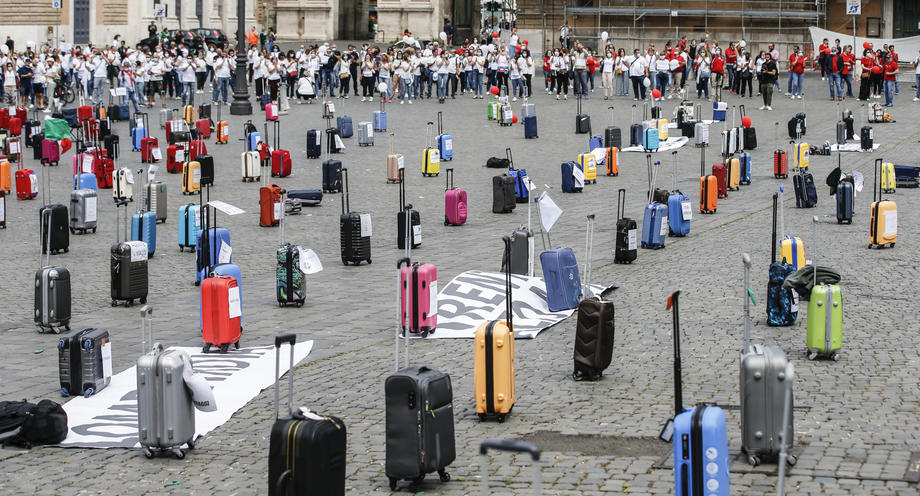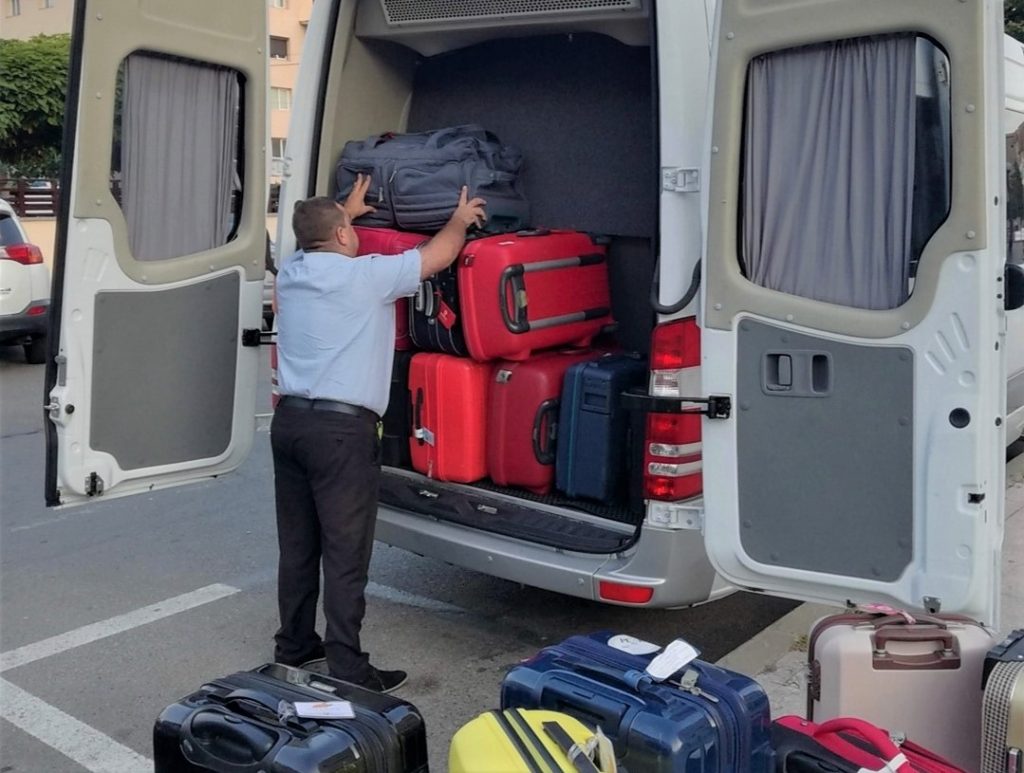The Covid Era turned the holiday into a “Fata Morgana”

Suitcases have become an accessory for protests – FOTO EPA-EFE/FABIO FRUSTACI
Here comes the holiday, there goes the holiday!
The tourism entered in a clinical death mode in the month of March with the risk of not fully recovering this year. We are in the month of June, a time when many of us should know how to instantly answer at the sound of the question : “What are you doing this summer?”
This was once upon a time…
Regardless of which European country you are in, whether you are in Romania or in the Italian peninsula, this question raises in many of us a somewhat discomforting feeling.” I don’t know yet, let’s see what’s with this damn virus ! Maybe later…”, “ This year I want to be cautious”, “ I don’t have a holiday anymore, they have anticipated it in April”, or “ I can’t wait to go on holiday in Greece!”, answers riddled with uncertainty, hopes, resignation and additionally contempt for this tiny and very contagious piece of gelatin that turned our world upside down. Our variety of plans made at the end of 2019 were lost in the horizon like dandelion fuzz blown away by the wind.
In the previous months we all lived holding our breath at the terrible moments of the pandemic: everything unrelated with the health suddenly became insignificant. The trips, accommodations or the carefully planned holidays towards which we intensely dreamed of at the time we booked them, were canceled. Who can possibly think about spending free time when the whole planet is in the claws of an unknown virus? The worldwide quarantine extended following a domino effect, from east to west and from north to south, managing to reach all the corners of the globe.
Currently, although in other continents the virus still continues to reign havoc, Europe overcame its hard times and Europeans slowly start to resume their usual day to day life. The European borders reopened their gates and the freedom of movement , denied in the previous months, remains just an unpleasant memory now that it was restored. We are starting to be aware that we are facing a different sort of “normal” , one conditioned by physical distancing measures between individuals , to further prevent possible infection with the SARS CoV2.
The social progress is in free-fall.
The global quarantine imposed by the Covid 19 revealed the sensitivity of many activities. The virus blocked whole economic areas and various educational systems, but what’s worse is that it revealed the frailty of national health services worldwide , even in developed countries. According to a recent report of the United Nations, the pandemic’s impact over our societies is so significant, that it would have negatively shifted the social progress index, an instrument used to measure the quality of life and welfare of the countries.
The world experienced many critical scenarios in the last 30 years, including the financial crisis of 2007 – 2009 , but neither one has left such a deep mark: “ We expected a slow down , but not at this rate. It is of concern not only the reduction but also the fast pace of the tendency” – are the unsettling words of the executive director of the United Nations Development Programme, Achim Steiner.

A Romanian driver loads the luggage of Italian tourists.
The tourism, the ignored Cinderella
Upon waiting for the vaccine, we can’t ignore the fact that we have to live in a scenario in which the most afflicted sectors need support from the authorities to survive. One of them is tourism, the sector dealing with scheduling the free time of individuals from advanced economic societies.
Romania is starting to become an appreciated destination by foreign tourists and thus many tour operators from abroad laid out and successfully sold cultural touristic circuits towards different points of interest from within the country. For example, Caldana Europe Travel , an Italian tour operator specialized in touristic circuits in Europe , declared itself by the end of last year satisfied by the rise of the Italians interest for Romania. Many tickets would have been sold if the pandemic which triggered the cancellation of all travels had not occurred.
In Italy, for example, the only tourist branch which restarted itself at the end of the month of June is the proximity tourism : city tours limited to a number of maximum 9 persons to allow the distancing imposed by the current anti Covid 19 legal norms. In Italy, the tourism represents 13% of the GDP and is by far the most affected by the current crisis. While the beaches, thermal resorts or parks reopened their activity , the most hard hit area from the tourism industry is the one pertaining to organized groups. The new physical distancing rules, the wearing of the mask for the whole duration of the trip but also the fear prevent many from choosing a holiday with the coach. There are many signals of openness towards the proximity tourism , at sea or at the mountain, in places less circulated that could allow a complete escape , far away from info about Covid. An impossible endeavor, by the way.
Neither the hotel industry fares any better. According to analysis performed by Frederalberghi, an organization reuniting the hotels from the peninsula, only 40% of them reopened their activity whilst 26.8% decided to remain closed throughout the month of June.
The coach companies, the touristic agencies , tour leaders , guides and drivers are declaring themselves as the invisible working force of the branch , although they provide an important share of customers in Italy and many European countries. Besides the tourism agencies , to whom 25 million euros were allocated , everyone else was ignored by the Italian government within the anti crisis measures pact. These days there are coming out in the streets with empty suitcases and demand visibility through protest rallies organized in many Italian regions. The workforce of the Italian’s organized tourism want to be optimistic and hope to return back to work from the month of July. Actually, the tour operators after a careful study of the general situation rethought the national offer and put out for sale holiday tickets for tours in Italy and Europe available from July onward. Furthermore,they provide a further safety net to the interested client, by offering the possibility to cancel their trip within three weeks with no penalty. The post quarantine period unfolds itself in a similar climate to that from the beginning of the pandemic , from the end of February, when citizens of some countries or regions didn’t had free movement access from one state to another without the obligation to enter in quarantine. Currently, the borders of the EU are partially open, some countries preferring to furthe maintain a line of caution like for instance Spain. One of the first countries from the post COVID era that opened wide the borders to everyone is Italy, also being aware of the importance the tourism represents for her own economy and worth noting, the safety it can provide to all its visitors.
***
Originally written in Romanian by Simona Vălan
Translated in English by Albert Reich | Materialul în limba română poate fi citit aici


